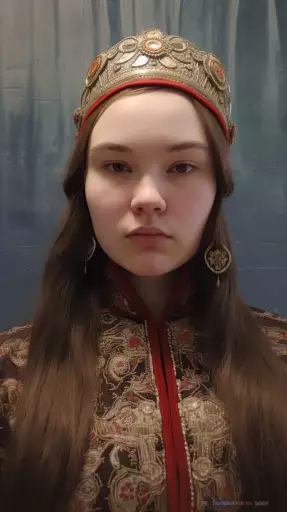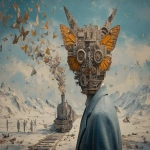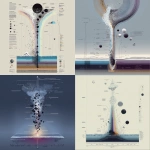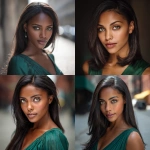Explore the Best AI Image Gallery

The Algorithmic Brush: Exploring the Ethics of AI-Generated Media
The realm of creativity is undergoing a profound transformation, driven by the emergence of artificial intelligence (AI) capable of generating media content. From realistic images and videos to compelling music and text, AI algorithms are blurring the lines between human and machine creation. This raises a myriad of ethical considerations that demand careful examination as we navigate this new frontier.
The Creative Industry in Flux
AI-generated media has the potential to revolutionize various sectors of the creative industry. Artists can leverage AI tools to enhance their workflow, generate novel concepts, and explore uncharted artistic territories. Designers can utilize AI for generating prototypes, creating personalized experiences, and streamlining design processes. The entertainment industry stands to benefit from AIs ability to produce realistic special effects, generate immersive narratives, and personalize content for individual viewers.
Potential Applications: A Glimpse into the Future
- Art Generation: AI algorithms can create original artwork in diverse styles, pushing the boundaries of artistic expression and democratizing access to creative tools.
- Content Creation: Writers, journalists, and marketers can utilize AI to generate text content, draft scripts, and personalize marketing messages at scale.
- Music Composition: AI-powered tools can compose original music pieces in various genres, collaborate with human musicians, and create dynamic soundtracks for films and video games.
- Design and Prototyping: Architects, product designers, and engineers can leverage AI to generate design concepts, simulate prototypes, and optimize designs for functionality and aesthetics.
Ethical Considerations: Navigating the Uncharted Waters
While the potential benefits of AI-generated media are undeniable, it is crucial to address the ethical challenges that accompany this technology.
- Copyright and Ownership: Questions arise regarding the ownership rights of AI-generated content. Who holds the copyright—the creator of the AI algorithm, the user who provides input, or the AI itself?
- Bias and Fairness: AI algorithms are trained on massive datasets, which can reflect societal biases and prejudices. This raises concerns about the potential for AI-generated media to perpetuate harmful stereotypes and discrimination.
- Transparency and Accountability: The decision-making processes of complex AI models can be opaque, making it difficult to understand how AI-generated content is created. Establishing mechanisms for transparency and accountability is essential.
- Job Displacement: The automation capabilities of AI may lead to job displacement in creative industries. It is important to consider the societal impact and explore strategies for reskilling and workforce adaptation.
Future Trends: Shaping the Landscape of Creativity
The field of AI-generated media is rapidly evolving, with ongoing research and development pushing the boundaries of what is possible. Some key future trends include:
- Increased Personalization: AI will enable highly personalized creative experiences, tailored to individual preferences and interests.
- Enhanced Collaboration: AI tools will facilitate seamless collaboration between humans and machines, fostering new forms of creative expression.
- Emergence of New Artistic Forms: AI will likely give rise to entirely new artistic forms and mediums that defy conventional boundaries.
- Ethical Frameworks and Regulations: As AI-generated media becomes more prevalent, it is crucial to establish ethical frameworks and regulations to guide its development and use.
The integration of AI into the creative industry presents both exciting opportunities and complex challenges. By fostering open dialogue, promoting responsible innovation, and prioritizing ethical considerations, we can harness the power of AI to unlock new realms of creativity and enrich our cultural landscape.
](https://images.ai-img.art/thumbnails/150/10ab1dbb1358d3dbba41472a395400bd9daf5cba3f5c8841970b4110820d5a15.webp)
](https://images.ai-img.art/thumbnails/150/f7e46d83151e744219d4886ca1329794d3e9d5071649abea0b2996cb34c3c77c.webp)





](https://images.ai-img.art/thumbnails/150/6650b0d98c6fec81df8bdfb569e0033970b46a653d188dde42417e624901493f.webp)




](https://images.ai-img.art/thumbnails/150/230fb1adf4241373591167585daecc4556f4c58c4d0dc33638c62b1c60c1b72a.webp)
](https://images.ai-img.art/thumbnails/150/58fa7e3c741db40e9e61e20410c8d5675b11efb625df109812cc768f9b17b717.webp)






](https://images.ai-img.art/thumbnails/150/266c825c7f03beff90a8a60e36207b8240cdf722eb1cf5db26e8adb51b992287.webp)






](https://images.ai-img.art/thumbnails/150/396b1c442fa4d576e35f871ba0f3c7e52bb62c6bcee69082dbcb816a5fd3aa8c.webp)

](https://images.ai-img.art/thumbnails/150/b814eba984b490e7f87095501b4c13b17e89f8960f044f09fbf2053969d9be29.webp)



](https://images.ai-img.art/thumbnails/150/bda14621f89269b376d6681934fea3c4af8c5f8593b80e1cb25cdf0047f98621.webp)












](https://images.ai-img.art/thumbnails/150/2f4f685af05f9526e1ac2f05f53dbb1d97bf8a65f6a41c6e67059c5ed2aa871f.webp)


